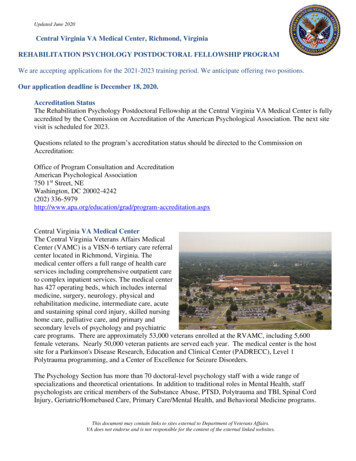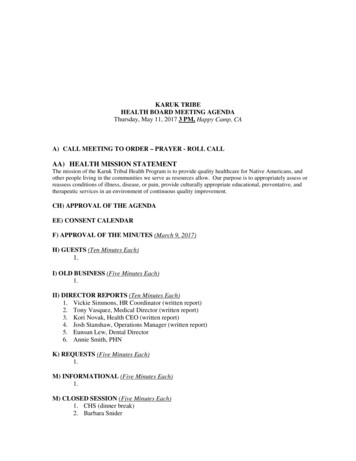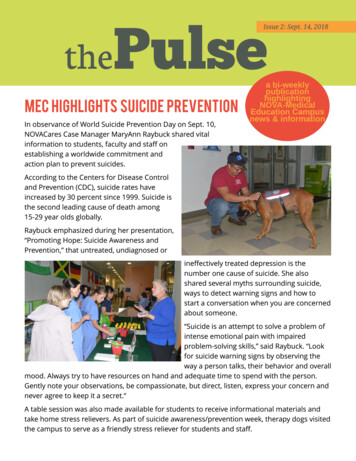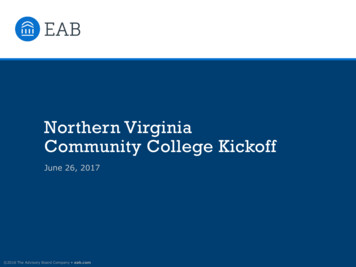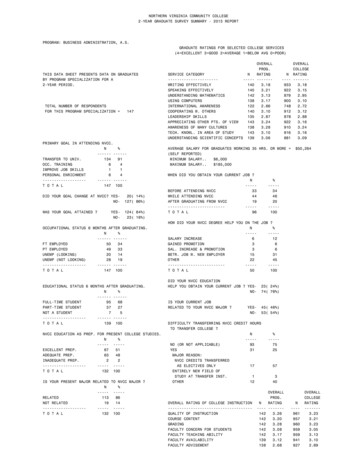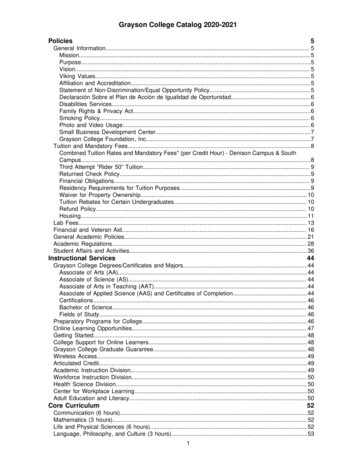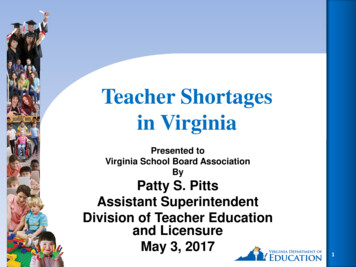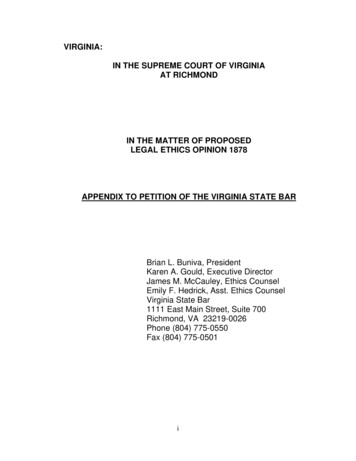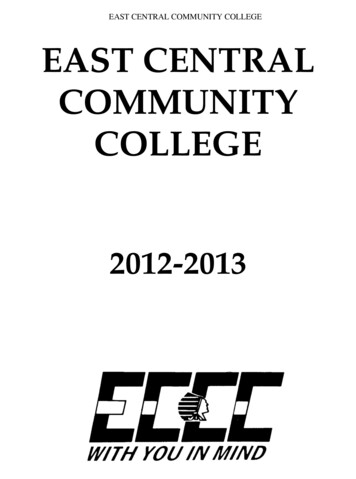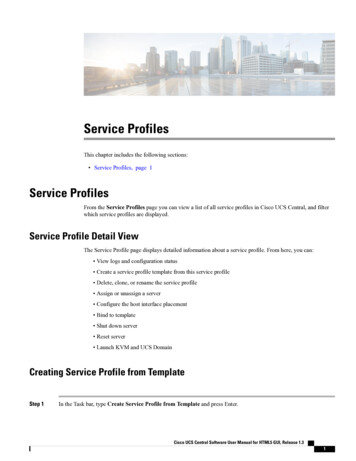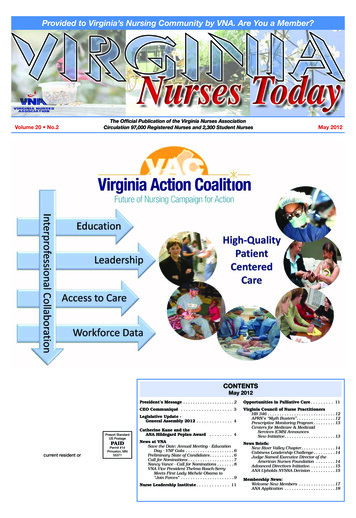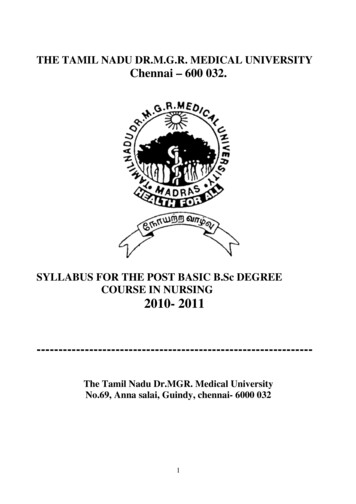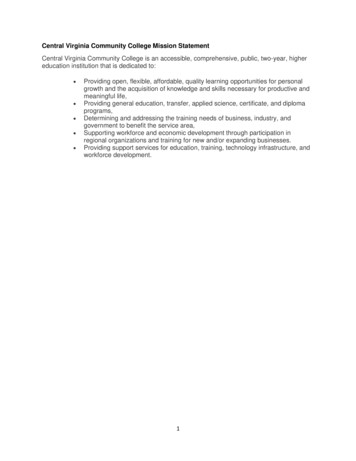
Transcription
Central Virginia Community College Mission StatementCentral Virginia Community College is an accessible, comprehensive, public, two-year, highereducation institution that is dedicated to: Providing open, flexible, affordable, quality learning opportunities for personalgrowth and the acquisition of knowledge and skills necessary for productive andmeaningful life,Providing general education, transfer, applied science, certificate, and diplomaprograms,Determining and addressing the training needs of business, industry, andgovernment to benefit the service area,Supporting workforce and economic development through participation inregional organizations and training for new and/or expanding businesses.Providing support services for education, training, technology infrastructure, andworkforce development.1
Summary of Accomplishments of Professor Cynthia R. DeutschTeachingCynthia Deutsch, professor of psychology, has established an outstanding record of teachingand service with a strong reputation for student connection. Having taught more than 6,000students across her 18 years as an educator, Cynthia strives for excellence in her work withstudents from a variety of backgrounds. Her courses are both challenging and accessible,allowing students with varying backgrounds the opportunities to explore their strengths, grow asstudents and citizens, and ultimately achieve success. Her reputation for combining academicrigor with compassion and flexibility are known across campus, making her courses extremelypopular. She is described as “a zealous educator with a gentle but enthusiastic desire to shareher knowledge and love of psychology with her students”. Students know they will have a greatacademic and personal experience in her classes. Her teaching evaluations are always positivewith an average score of 4.79 out of 5.00 on overall rating of instructor.Cynthia was awarded the Chancellor’s Faculty Fellowship in 2010, an award that is designed tosupport faculty to prepare themselves for top-level management and instructional positionswithin the VCCS. She has been the recipient of the Learning Environment Award from studentsseveral times and was the recipient of the Faculty Leadership Award twice at Central VirginiaCommunity College. In 2019, Cynthia had the tremendous honor of receiving the Susan S.Wood Professorship for Teaching Excellence Award from the Virginia Community CollegeSystem. This is a significant achievement awarded annually to a faculty member whose careerreflects a history of striving for excellence, commitment and dedication to students, creative andinnovative approaches to teaching, active involvement in the discipline, who demonstratesleadership and collegiality among peers (at the college, state, and/or national levels), and whoreflects continuous professional growth and development during his/her continuum of being afaculty member. In the words of Dr. Susan S. Wood, “I am impressed by your dedication tostudent success and your extensive professional activities, both at CVCC and beyond. Youexemplify faculty excellence.”Teaching At Central Virginia Community College, Cynthia teaches Principles of Psychology (PSY200), Developmental Psychology (PSY 230), Abnormal Psychology (PSY 215), Psychologyof Death and Dying (PSY 116) and occasionally Psychology of Criminal Behavior (PSY255). She teaches in multiple formats, including traditional face to face, online, and hybrid.Students regularly comment about her passion and enthusiasm for teaching: “You can tellshe is passionate about her job and she really cares about the students.”Cynthia was nominated by the CVCC president to attend the Virginia Master TeacherSeminar, a VCCS summer professional development seminar for college educators. Shealso supports the Great Teacher Seminars at Central Virginia Community College, whichprovide extraordinary professional development opportunities for all faculty at the college.To help ensure that all students are held to the same level of expectation across thePrinciples of Psychology course, Cynthia was actively involved in the creation of ArticulatedLearning Outcomes for PSY 200 within the VCCS Peer Group. As a result of this effort, allPrinciples of Psychology courses across the Virginia Community College System now followthe same Student Learning Outcomes in line with recommendations from the American2
Psychological Association (APA), ensuring that all students in this high-enrollment courseare working towards the same goals.Cynthia offers opportunities to students interested in pursuing psychology as a major thathelp them learn about and explore the field beyond the classroom experience. Sheencourages honors-level work allowing students to conduct original research and presenttheir findings at the Virginia Psychological Association Annual Meeting and the VirginiaSocial Science Annual Meeting.Cynthia works regularly with students outside of the classroom looking for ways to provideadditional support to those with increasing workloads and daily demands. Recognizing thedemands of her students’ stressful lives, Cynthia offers regular workshops on test anxietyand stress reduction. She also incorporates elements of these topics into all of her owncourses as well as sharing strategies with students across campus by serving as a guestlecturer in other courses. These workshops are available to all students on campus orthrough a virtual webinar if their schedules do not allow them to attend. “Cynthia is veryinvolved with her students, offering assistance where needed and showing her concern forthem as both students and people. In the past, she has directed students to resources thathave, quite literally, saved people’s lives as well as directing them to resources that allowedthem to finish the semester or their degree.” (Dr. Tom Sparhawk, Professor of Sociology)Cynthia was a leader in bringing Open Educational Resources to Central VirginiaCommunity College. Always cognizant of the increasing costs of higher education, sherecognized the value of OER. As an early adopter of this format at CVCC, Cynthia helpedlead the one-year, 200,000 Z-23 grant to support the VCCS’s goal of scaling Z-Degreesto all 23 VCCS colleges. Cynthia was also instrumental in an Achieving the Dream Grant,serving as the co-leader on an OER initiative that resulted in the creation of more than 35Lumen-certified OER courses and three distinct OER degrees at CVCC.Cynthia’s online courses have undergone extensive peer review, and she has participated inthe peer review process for other online courses at CVCC. She teaches sections ofDevelopmental Psychology, Abnormal Psychology, Psychology of Death and Dying andSocial Psychology entirely online. These are popular, high-demand sections with doubledigit enrollments each semester. “Professor Deutsch is easy to reach, friendly, andstructures the course in such a way that it is feasible to grasp the material. We had manyclass discussions that help me understand the material better” – (former student)Many of Cynthia’s students transfer to the University of Lynchburg, where she also teachesa graduate section of Human Development in the department of education, helping toprepare future teachers for the K-12 system. This course is also popular with the students,providing them opportunities to engage and prepare for the challenges they will face aseducators in a complex system.Furthering her connections between the K-12 and the community college system, Cynthiaparticipates annually in the AP Psychology Read, an intensive seven-day grading programwhere psychology educators from both the K-12 and higher education meet and score highschool AP exams based on an agreed-upon rubric. The experience has led to improvementsin rubric creation in her own teaching, a stronger connection with local schools that areteaching AP psychology, and the creation of strong bonds with psychology instructorsacross the country. This work also allows Cynthia to have a better understanding of the workthat is being done at the K-12 level and meet her students where they are when they enterher class.3
Due to her abilities to connect with students, Cynthia’s classes are specially chosen for theEarly College programs and for other dual-enrollment programs on campus.Cynthia also has a way of connecting with the CVCC veteran student population. Theveteran’s coordinator intentionally places students in Cynthia’s classes because she knowsstudents will get the support they need for a successful transition from the military to theacademic environment. Cynthia maintains connections with many of these students,helping them in multiple ways as they continue to transition from school into work settings.Cynthia engages in extensive advising of students outside of the classroom, meeting withstudents on a regular basis to provide support and guidance to help them progress throughtheir academic programs. She regularly writes recommendations for students to assist themwith transfer to 4-year academic programs, graduate programs, careers, and applications forsupporting scholarships. Many of her students have gone on to master’s and Doctoralprograms with her recommendations. “I appreciate you very much Professor Deutsch!Thank you so much for teaching me over my 2 years here, and I will certainly miss you nextyear (as I transfer).” (former student)DiscoveryCynthia came to teaching with a strong background in research, having spent several yearssupervising drug-treatment research protocols in the Los Angeles area and working ineducational and institutional research settings in Southern California and Arizona. Herbackground and passion for research have served as a foundation in her teaching as sheintegrates real world research applications into her courses. Cynthia has authored a well-citedpublication that evolved from her dissertation work on self-perceived burden in cancer patientsand has presented at numerous conferences across the country. She also serves as an editorialboard member and reviewer for several academic journals in her discipline. Cynthia published her dissertation research in the academic journal Current Psychology.The article “Individual Characteristics and Self-Perceived Burden” was published in 2014 andhas since been cited numerous times in articles published in academic journals such asEuropean Journal of Cancer Care, Psycho-Oncology, Supportive Care in Cancer andCirculation: Cardiovascular Quality and Outcomes.Prior to the publication, Cynthia presented her dissertation research “CognitiveCharacteristics and Self-Perceived Burden” at the American Psychological Science AnnualMeeting in 2013.While leading the topic selection committee for CVCC’s Quality Enhancement Plan (QEP),Cynthia conducted extensive research with the college constituency which led to thesuccessful identification of the QEP topic, “Building Better Writers”.After identifying the QEP topic, Cynthia co-chaired the QEP for five years conductingextensive research on effective peer tutoring practices and established a successful writingcenter. The results of these investigations and efforts led to the creation of a new WritingCenter on the CVCC campus, a student support service dedicated to the support of studentwriting across all disciplines, and a brand new peer-tutoring program to support the WritingCenter, as well as successful reaccreditation for Central Virginia Community College.Cynthia presented the creation of the peer-tutoring program and writing center at the VCCSNew Horizon’s Conference as part of the 2017 Excellence in Education Awards program.4
With her extensive involvement in the development and adoption of Open EducationalResources, Cynthia has presented at numerous conferences on OER, including the OpenEdconference, the VCCS New Horizons Conference and a VCCS Educational TechnologyConference in Roanoke Virginia. She is certified to teach OER courses through thesuccessful completion of the VCCS Pathways Course on OER. She has also been active intraining efforts to support colleagues who also wish to use OER for their courses.Due to her focus on bringing useful technologies into the classroom, Cynthia was an earlyadopter of Canvas, the new VCCS learning management system. Using her knowledge ofthe system, Cynthia provides training sessions to her colleagues, helping the college movethrough a complicated technology change from Blackboard to Canvas in 2019.Recognizing the powerful potential for student support, Cynthia was also an early andenthusiastic user of the new Navigate technology, again serving in a training capacity tosupport her colleagues during significant changes on campus. She has since become a“super-user” of the Navigate system, allowing her to lead trainings on campus and assist hercolleagues with the new technologies.Cynthia has conducted research on and presented on the effectiveness of the hybridclassroom design. In 2013, she presented results from a study on the Development andTeaching of the Hybrid Design at the Eastern Teaching of Psychology Annual Meeting.To better support her work in the classroom, Cynthia earned a graduate certificate in HigherEducation from the University of New Hampshire, a 12-credit certificate program that isdesigned to prepare and enhance the effectiveness of college teaching.Cynthia is an active member of the psychology peer group in the VCCS and has presented atnumerous peer group meetings on topics such as OER and active learning in the classroom.Cynthia represented CVCC on a panel with the former Secretary of Education, Ann Holton, atthe request of the college President. The state listening tour, addressing disparities in highereducation focused on highlighting problems and brainstorming solutions for communitycollege students.Knowledge IntegrationCynthia’s success in higher education is a direct result of her ability to integrate her passion forteaching and research as well as her dedication to student success. Cynthia’s leadership of CVCC’s Quality Enhancement Plan was instrumental in thesuccessful reaccreditation of Central Virginia Community College in 2014. The result of thesuccessful QEP was the creation of a new Writing Center on campus along with a new peertutoring program to support the center. Since its opening in 2014, the Writing Center hasprovided academic support for more than 3500 students enrolled in developmental Englishclasses or other writing intensive courses. The Writing Center is now in its 6th year ofoperation, is CRLA certified, and successfully employs two professional writing coachesalong with eight to ten peer-writing coaches annually.As part of the Quality Enhancement Plan, Cynthia was instrumental in bringing Dr. HunterBoylan, a national expert in developmental education, to CVCC for an inclusive professionaldevelopment opportunity for faculty and staff. The event, which was attended by more than40 CVCC employees, addressed changes in developmental education and providedknowledge of the unique hardships that poverty presents to struggling students, especiallythose who do not have a family history of college attendance.5
Due to the success of the CVCC QEP, Cynthia was asked by SACSCOC in 2018 to serveas the QEP Lead Evaluator for an onsite accreditation visit at Kilgore College. Cynthiareviewed the Kilgore College QEP and met with constituents across the campus, offeringguidance for improvement on their plan. Dr. Denise Young, the Vice-President forSACSCOC was particularly impressed by the work that Cynthia did with this team, calling ita “superb job as the QEP Lead Evaluator.”At CVCC, Cynthia is involved with other college programs. She serves annually on anevaluation panel for a capstone course for the Electronics and Computer Technology AASdegree. In this course, students spend a semester researching and writing a significantresearch paper on a cutting-edge technology. Cynthia “comes to class and aids the studentsin considering the potential impacts to society of the technology. Most of the students aremuch more comfortable with the technical side of their topic and convincing them toparticipate in open discussion on difficult topics is challenging. Cynthia manages this taskwith ease and fruitful results. Although the topics are outside of her academic area ofexpertise, she enthusiastically participates, pushing the presenters with thoughtful questionsat the end, and leaves encouraging yet constructively critical feedback and suggestions. Allof this input is outside of her extensive institutional responsibilities. “I appreciate her help,perspective, and contribution to my students’ future successes.” (Marcella Gale AssociateProfessor Central Virginia Community College)ServiceService underlies all that is central to the mission of the community college, and Cynthia is nostranger to this critical aspect of education. Beyond her dedicated service to the college and theVCCS, Cynthia’s community involvements are also extensive. She has spent years with severalorganizations providing support to families and individuals dealing with cancer. Additionally, sheis actively involved in academic service that provides support to students, academicorganizations, and publications.Service to College and VCCS Cynthia has served on the CVCC Faculty Association for more than seven years. She beganby serving as the division representative, continuing on to be the Faculty AssociationTreasurer for one year, followed by a year as the Vice-President. She currently serves as thePresident of the Faculty Association and sits on the President’s Cabinet.Cynthia also serves as the CVCC representative for the Chancellors’ Faculty AdvisoryCommittee, which consists of elected representatives from each of the twenty-threecommunity colleges. Twice during the academic year, they meet in Richmond with theChancellor and his administrative staff for a collegial and free-flowing discussion thataddresses faculty concerns and issues related to student success.Cynthia currently serves on numerous committees at Central Virginia Community College,including the Faculty Association, the Professional Development Committee, Evaluation andAssessment, President’s Council, Student Success, and the Title III Grant SteeringCommittee. Cynthia also serves on the college’s CARE Team, working with colleagues toaddress the multitude of student needs outside of the classroom.For more than 10 years, Cynthia has served on the New Horizon’s Program ReviewCommittee, which reviews proposals for the annual teaching and learning conference for theVirginia Community College System.6
Cynthia served as the advisor to Phi Theta Kappa at CVCC from 2008 to 2015, whichdoubled in size during her tenure to more than 90 students. Under Cynthia’s leadership, twostudents were nominated each year for the All-Virginia Academic Team, and one of herstudents was nominated to the Top Ten All Virginia Team and was awarded a BronzeScholarship.Service to Community Cynthia volunteered from 2009 to 2015 at Camp Kesem, a weeklong summer camp offeredto children whose parents have or had cancer. She served as the grief counselor, providingguidance to camp counselors as well as direct support to children and family members.Throughout her time at Camp Kesem, attendance doubled to more than 80 childrenbetween the ages of 6 and 16. During this time, Cynthia also assisted Mark and Maya Silverin the creation of their publication “I’m a Teen, My Parent has Cancer and it Really Sucks!”,providing support for camper interviews and also serving as a resource for campinformation.In 2010, Cynthia was asked to serve on the advisory board for Camp Kesem, helping steerthe growth of the camp. She continues to work with Camp Kesem on the advisory board asthe camp continues to grow and provide support to families across Central Virginia.In Lynchburg, Cynthia provides direct support to cancer patients leading gentle yogaworkshops at the Pearson
Lumen-certified OER courses and three distinct OER degrees at CVCC. Cynthia’s online courses have undergone extensive peer review, and she has participated in the peer review process for other online courses at CVCC. She teaches sections of Developmental Psycholog
